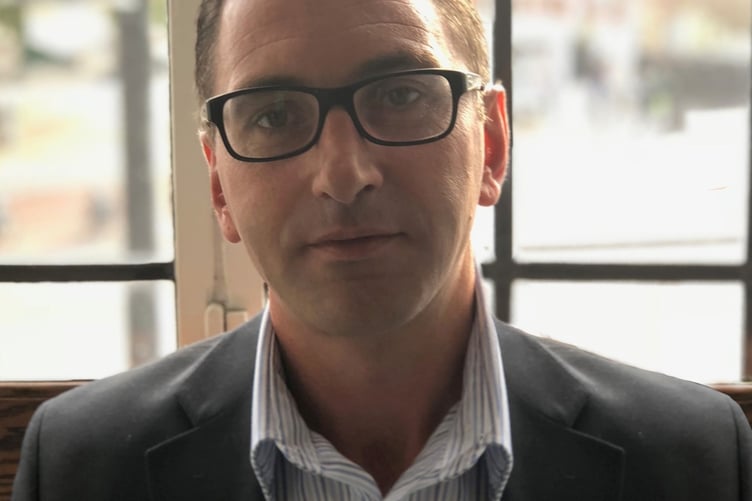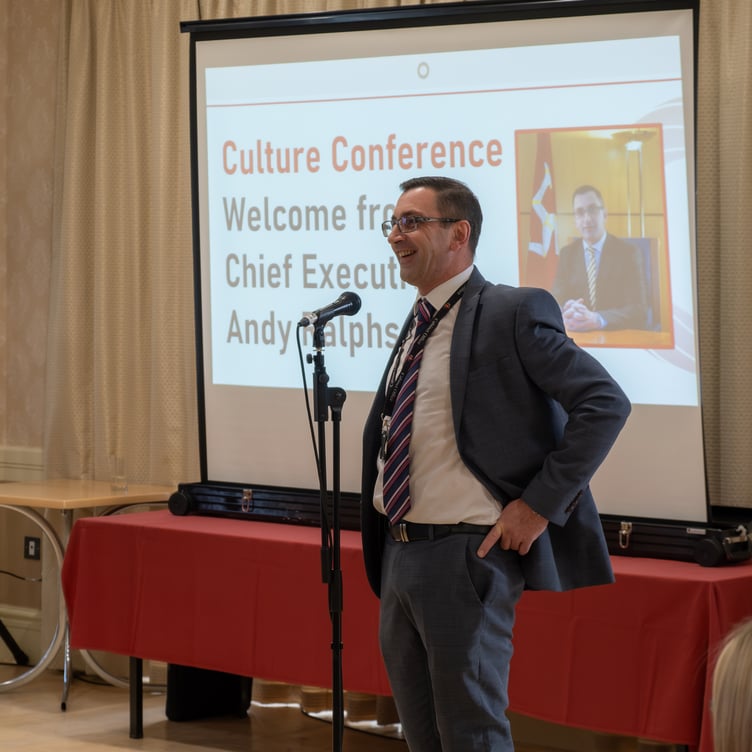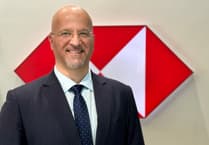The island’s top civil servant says much of his first 12 months in the job will be to bring more stability to the organisation after a difficult time during the Covid crisis and its aftermath.
Andy Ralphs began his job as chief executive of the Isle of Man Government in November.
He takes on the role after some upheaval in the civil service. Will Greenhow, the former chief secretary (the job title has changed to chief executive), left in 2022. A number of other department heads also left in the last couple of years.
Mr Ralphs’ job is to not only head the 8,000-strong public service but to advise government ministers on policy and present options to them. He is keen to emphasise that they are the ones to make the actual decisions.
Asked what his biggest challenge was, the 51-year-old said: ‘It’s around people; recovery from Covid. It has been a very difficult time for the organisation. There’s a new leadership team in place. It’s my role – and I see this as an absolute priority over the next 12 months – to get this organisation back on its feet, so people feel value and our communities know what we’re doing and how we’re delivering those priorities.
‘I’m not ashamed of saying that my focus over the next 12 months is going to be around the organisation and the people who work for us.
‘Then we can start having the bigger, more strategic conversation about how we might need to reform and change in the future.
‘What’s really evident to me is to make sure that we’ve got everybody on board and that we’re delivering the best that we can with the resources that we’ve got within a very tight budgetary framework.’
How is morale in the civil service?
‘It’s not where we need it to be,’ Mr Ralphs said. ‘People feel very overworked and there have been some historic issues that were well publicised that we need to recover from and make sure that those issues never materialise again.
‘My role is to ensure that we have got good governance and good performance management in the organisation.
‘As senior officers, we’re accountable for our actions and the actions of our people.
‘Making sure that we have the right culture in the organisation is the task for the next 12 months and we’ve already started that conversation with staff.
‘We’ve got a lot of things to be proud of as an organisation. We need to focus on our people and the workforce of the future – how we develop people into new roles and into senior roles.’
Mr Ralphs joined the government from Plymouth City Council, where he was strategic director of customer and corporate services.
His CV includes starting in the private sector, working for the RAC and then BT. He went out to California for nearly three years working for AOL and supporting its operations for Europe and North America.
He says his specialism in the private sector was helping organisations grow their people, grow their digital capability and ‘scale up’ their customer operations.
When he returned to Britain, he began to work for the London council of Waltham Forest in 2003 and then went on to more senior roles in the civil service and local government. There he learned about working with politicians and shaping agendas – and also getting used to politicians making the decisions.
He said: ‘Having to craft that sort of trade was quite challenging. It was very frustrating as well, coming from the private sector.
‘The public sector always feels like it takes so long to get stuff done.
‘It’s not really until you are in the role that you understand why you need to take time and why decision-making is really important.
‘The public sector needs to be open and transparent.’
He added: ‘My end game was always to get all that experience and to become a chief executive officer.
‘When I saw the role for the Isle of Man Government, I thought it was a really unique proposition.
‘When I say “unique”, an island of 85,000 people has its own national government, makes it own laws. It has all of the infrastructure of a large jurisdiction but also is responsible for the delivery of services and all the commissioning of services and a broad range of arm’s-length companies that help to deliver services on behalf of the island.
‘With my local government experience, my central government experience and my private sector experience, I thought: “This would be absolutely amazing. I could put all of those skills together and help the island to move forward from what has been quite a difficult few years.”’
He said those difficult years had been well-publicised – the impact of Covid, the cost of living crisis and the changing world economy.
‘Our customers and our communities expect us to offer to do things differently but still respect the great things about this island,’ Mr Ralphs said.
‘One of the things I have noticed about the Isle of Man since I’ve been here is that sense of community, that sense of place – the identity the island has.
‘It’s going to be my job to preserve all of the above but make sure that public service is running in the most efficient way that it can and that it evolves in the next 10, 15, 20, 30 years because we need to be thinking about the future, not just about today.’
Reform is on a longer-term agenda.
‘My absolute focus over the next 12 months is around the organisation and its people and the good governance of the public service,’ said Mr Ralphs.
‘When we look at the longer term, there is a need to think about reform in its broadest sense. What do I mean by reform?
‘The first is about transformation and making sure that public services are efficient as they can be and serve communities in the most efficient way.
‘That includes improvements around our digital services, customer access, improvements around our people is a really important aspect.
‘In terms of the budget, it’s about making sure that we can stay within the financial constraints that we’ve got, focusing on priorities and what those political priorities are and making sure we deliver the island plan, so we are delivery-focused.’
He is positive about his colleagues.
He said: ‘A lot of people say: “Why do you want to work in the public sector? You could do so much more in the private sector.”
‘What I’ve learned about the public sector is that I really feel that all of the people who work in the public service feel that sense of delivering for communities, delivering for outcomes for communities. Sometimes that gets lost in translation.
‘There’s always an exception to the rule. But I don’t know of anybody who comes to work in the public service that comes to do a bad day’s work. They are very committed.

‘One of the highlights of the recent Covid report was that people were working hard and we can be really proud of what we achieved for the island. We must hold on to that. Living within our means, making sure that we’re spending taxpayers’ money responsibly and delivering outcomes is really key.’
The longer-term strategic aim is public sector reform and how do government, local government and the private sector work to deliver the best outcomes for the island.
In 2006, the government commissioned a team of experts to look into the future of the public sector.
It was called a Review into the Scope and Structure of Government and made recommendations about privatisation and corporatisation.
It was largely ignored by the government of Tony Brown at the time and a further examination under the Allan Bell administration in the wake of the UK government’s VAT clawback, led to no radical changes,
Mr Ralphs said: ‘In the future we’ll be undoubtedly wanting to have a conversation both politically and with communities and organisationally about the future role for government, the future role for local government and our communities.
‘I think anything around public service reform takes a lot of strategic thinking. I would be saying public sector reform and all the options and maybe approaches to that – you’re really looking five to 10 years into the future.’
He added: ‘It’s about reinvigorating that conversation now and having that discussion and getting people’s and communities’ views.
‘One amazing thing about the public service here is about 22 to 23% of the working age population in the Isle of Man works in the public service.
‘The other unique proposition is that about 99% of those people live on the island. You don’t have that across because people are very transient.
‘One of the things we need to change is the narrative to say that the civil service is delivering for the island and we are doing the best for the island.
‘The best way I can do that is to change the narrative in the organisation. When they speak to their friends and family who perhaps sit outside the public service – that’s why workforce is really important.’
In terms of reform, he added: ‘Having honest conversations is really important.
‘If you avoid the honest conversation we will get to a point that there will be a tipping point where things become unaffordable, services aren’t run to their optimum. Having those conversations with the community is very important for the future.’
He said that his experience on the Isle of Man and in the UK was that politicians is that they do generally have their communities’ interests at the heart of everything they do.
What about MHKs’ short-termism, being afraid to make long-term strategic decisions because of the electoral cycle?
‘I don’t think that matters whether you’re in a small or large jurisdiction,’ he said. ‘What we’ve got is the Island Plan, which is the strategic road map. That is our plan.
‘Of course, people will have views on the Island Plan. The great thing about it is that it can be picked up administration by administration and you can iterate around the edges. But the key things around making sure that we have a sustainable island and are focused on climate and the green agenda; making sure we’ve got the right infrastructure in place are absolutely the right things to be doing and the right things for the island.
‘We’re always going to have to be flexible about how we might go about things. It’s my job and the chief officers’ job to make sure we have the right strategic approach to the organisation, that we’re giving ministers a range of options for them to consider and it will be up to them to make the decisions that they feel are the right ones for communities on the Isle of Man.
‘Whether we’ll ever be able to satisfy everybody is questionable. That’s the nice thing about democracy and politics is that you can have those debates and people can have their say.’
Mr Ralphs, who’s currently living in a flat in Port Erin, says he’s impressed with the Isle of Man’s sense of community.
‘I went into my local pub for a pint and I did literally walk in, have a pint and go home, he said. ‘The next day I went in, they knew my name, they knew what pint I wanted and they knew where I lived.
‘Some people might find that absolutely intrusive but I think that’s lovely. I felt really welcomed.’
He also mentioned the biosphere.
‘I think there’s a really great future around biosphere and how we promote that and build on it,’ he said.
‘I think we have a unique selling proposition around our biosphere status, around being a climate-friendly island and making sure that we are sustainable moving forwards.’
He said there was a need to attract more people originally from the Isle of Man back to the island after they’ve worked elsewhere.
‘When we’re looking at the wider role of education on the island. There’s a big question around university status (for University College Isle of Man) that we can look at in the future.’
There is a lot of criticism that the public sector seems to keep on growing.
Mr Ralphs said: ‘What are you comparing numbers with? The public sector is very diverse in its make-up.
‘As new projects come on board, it requires a different capacity with different expertise. So public service numbers might appear to be going up but the number of services we’re delivering are also going up.
‘I don’t think it’s as simple as saying the numbers are increasing. I think that’s just not true in itself.
‘There will always be questions on the size of the public service and there will be in the future opportunities to do things differently.
‘So the role of artificial intelligence, the role of digital, how people access our services.
We must appreciate that the Isle of Man, like a lot of other economies, has quite an ageing population.
‘The quality of delivery is important still. Making sure we’ve got good digital processes and we’re really benefiting from technology to drive efficiency within the public service is really important, but understanding that not everybody can access those services.
‘We need to be ready for a demographic that’s going to change in the next 20 or 30 years.
‘We have to adapt the organisation to digital ways of working with will ultimately drive efficiencies in the future.’
Mr Ralphs is a father of five and a grandfather of two.
His oldest child, who’s 30, is a police officer. The youngest, 11, is in his last year at primary school.
When he’s finished there, Mr Ralph’s wife Frea and he will move to the island.
After many jobs and moving home a lot, Frea told him ‘this is it’.
‘We have moved from York to London to Cornwall, now to the Isle of Man so as long as I’m still wanted here this will be one of my final destinations in terms of my career.’
A career in the civil service wasn’t always on the cards for Mr Ralphs. He is a qualified chef.
‘Unfortunately, doing commis chef work at 17 or 18 in the late 80s and early 90s and going raving just didn’t work together.’
Talking of raving, perhaps it’s not too surprising that the family’s favourite holiday destination is Ibiza.
‘My wife is a numerologist,’ said Mr Ralphs. ‘She has her own business. She really helps people with their careers and uses numerology as a means to inform them about their life paths. Ibiza being quite a spiritual island is a place dear to our hearts and is somewhere we may want to retire to in many years’ time.’
So far, Mr Ralphs has been exploring the island and his favourite place is the Victory Cafe at the bottom of Snaefell. On his first visit, this being the Isle of Man, he bumped into his new boss, the chief minister.
Soon, Mr Ralphs will be one of the highest-profile people in the Isle of Man.
So how will he judge his success?
‘Being chief executive can be quite a lonely place,’ he said. ‘The only person who can tell you you’re doing the right thing are yourself or you get validation from the outcomes that you’re trying to achieve.’

.jpg?width=209&height=140&crop=209:145,smart&quality=75)


